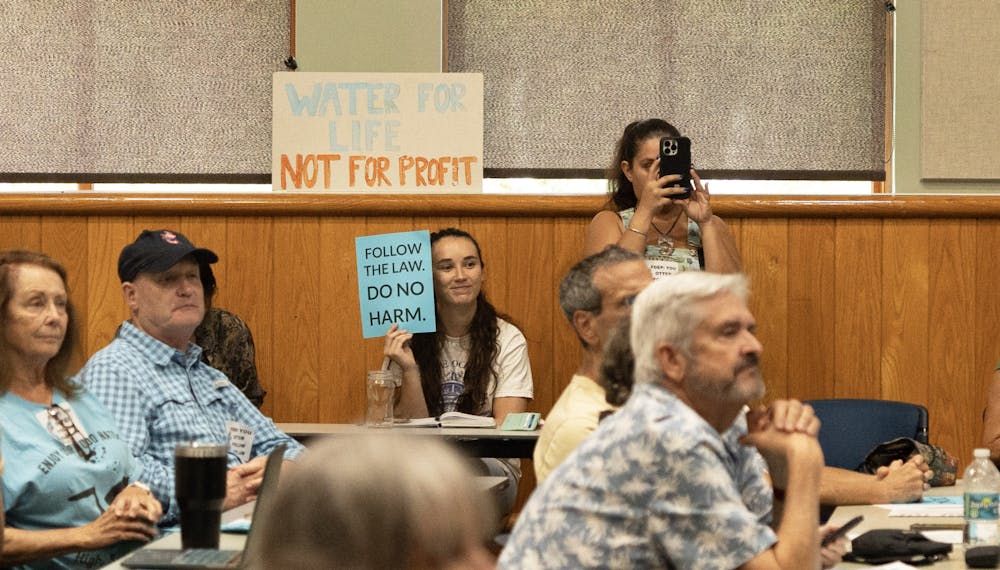Florida’s freshwater springs overflow with life, combining rich biodiversity with community recreation. Yet, springs activists argue a once-pristine environment is at risk of being ruined.
For nearly a decade, the Florida Department of Environmental Protection has been locked in legal battles with springs activists about Florida spring preservation. On Aug. 11, the FDEP proposed revisions to Chapter 62-41.400-403, F.A.C., which the agency claims will limit excessive harm to springs.
Advocacy groups, like the Florida Springs Council, fear the proposed revisions won’t help protect the springs and stop commercial water bottlers from overpumping Florida aquifers.
FDEP law states, “No permit issued by the agencies for the consumptive use of water shall authorize groundwater withdrawals that are harmful to the water resources.”
The law protects 30 of Florida’s largest or most historically important springs, referred to as “outstanding springs.” The proposed revisions to Chapter 62-41 would define what constitutes harm to water resources.
However, the department’s proposed harm laws do little to actually protect outstanding springs, Florida Springs Council Executive Director Ryan Smart said. Roughly 80% of the state’s outstanding springs are nitrogen-impaired due to pollution and overpumping.
An overabundance of nitrogen can lead to algae blooms, which can cause native plant and animal life within the springs to die out. This can lead to the decimation of ecosystems that can rarely be found outside of Florida. Algae can also cause springs to lose its water clarity, which can lead to illness in humans and pets.
“No one’s paying to go out on a springs system that’s covered in algae,” Smart said.
Nitrogen is commonly found in fertilizer, and 70% of state-wide spring pollution comes from the agriculture industry, he added.
Outside of environmental impacts, springs are cultural touchstones for many communities and the deterioration of the resource can lead to an economic loss, Smart said.
Wakulla Springs alone received over 180,000 visitors in the 2021-2022 fiscal year, contributing over $21 million to the local economy.
Pollution laws that are targeted toward agriculture companies aren’t heavily enforced, which makes spring preservation an uphill battle, Smart said. Overpumping only adds to this problem, as it’s difficult for springs with low water levels to dilute pollutants.
“We have a system in Florida where we essentially allow polluters and water users to just run wild,” he said.
FDEP allows companies like Nestle to pump up to one million gallons of water a day for commercial use, Smart said. The cost of obtaining a permit to pump that amount is a one-time fee of $115.
The Alligator reached out to FDEP six times, but the agency did not respond for comment. BlueTriton, formerly known as Nestle Waters North America, also did not provide a statement on its activities in Florida springs.
The St. Johns River, Florida’s longest river, is fed by over 100 springs.
The river has recently seen a significant reduction in freshwater flow due to overpumping, St. Johns Riverkeeper Lisa Rinaman said. The river’s flow has shrunk by 30%, according to the organization’s Facebook page.
The negative impacts will eventually extend to the local economy as the river, which stretches from Indian River County to north of Jacksonville, is a recreational river that supports commercial fishing, residential communities and tourism. Unsustainable water practices can take a heavy toll on the area’s economy, Rinaman said.
“When the rivers are unhealthy, that harms these communities downstream,” she said.
Rinaman attended an FDEP workshop Aug. 28, where about 100 springs activists gathered to give public comments about the agency’s proposed regulations. Citizens held signs reading, “Follow the law, do no harm” and shared their concerns related to the law’s revisions. FDEP will continue to take public comments until Sept. 18.
The workshop proved Floridians care about the preservation of the springs, Florida Sierra Club Lead Organizer Michael McGrath said. At the meeting, he said, FDEP representatives were provided with alternative language written by the Springs Council to use in the legislation.
Activists suggested legislation would eliminate escape clauses that allow FDEP to issue harmful permits, and create an effective water budget for Florida springs, McGrath added.
FDEP’s proposed harm rules are a rebranded version of legislation written in 2016, Florida House Rep. Anna Eskamani, D-Orlando, said. While Eskamani supports springs activists’ efforts, she said the issue isn’t with the legislation. The right laws are in place, the department just hasn’t enforced them.
“It’s the money in politics that is dragging the feet of this agency to do the right thing,” Eskamani added.
The secretary of the FDEP — Shawn Hamilton — was appointed by Gov. Ron DeSantis in August 2021. DeSantis receives hundreds of thousands of dollars in political donations from land developers, according to contribution records from the Empower Parents PAC.
Springs activists have already seen some success in their efforts, Smart said. Florida Springs council was able to stop land developments near Rainbow Springs and filed a lawsuit in May against Seven Springs Water Co. to stop a consumptive use permit.
The key to their success, Smart said, is using grassroots activism and citizen groups to hold government agencies accountable.
“It’s just about a state agency that refuses to follow the law,” Smart said. “And too many people love the springs for that to be an acceptable outcome.”
Zachary Carnell contributed to this report.
Contact Kylie Williams at kwilliams@alligator.org. Follow her on Twitter @KylieWilliams99
Kylie Williams is the Spring 2025 Digital Managing Editor and a third-year journalism major. She has also worked as the enterprise editor and the environmental enterprise reporter. In her free time, she can be found reading, baking or watching reality TV with her cat.






